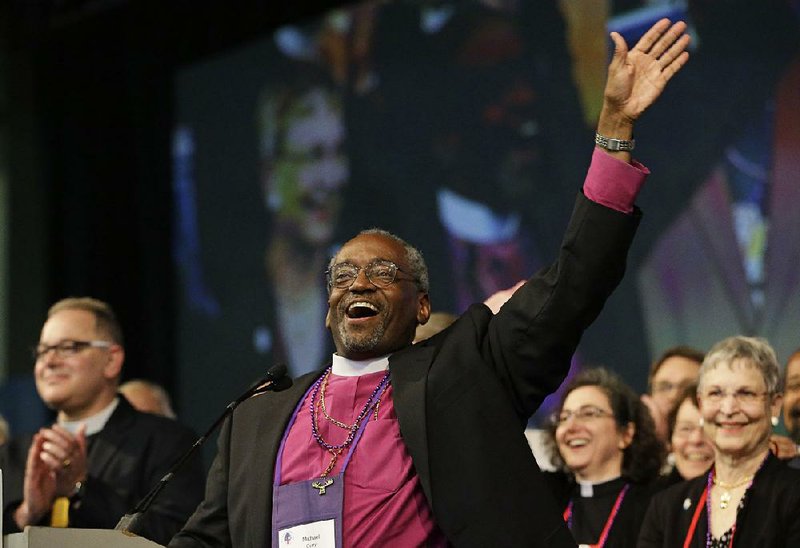NEW YORK -- The Episcopal Church, whose history is entwined with the founding of the United States, is installing its first black national leader this weekend.
Presiding Bishop-elect Michael Curry, who arrives at the job after nearly 15 years of leading the Diocese of North Carolina, was elected last summer to succeed Presiding Bishop Katharine Jefferts Schori, the first female leader of the church. Her nine-year term ends today, when Curry formally steps in during a ceremony at the Washington National Cathedral.
Curry will take leadership of the New York-based denomination after years of membership losses and amid ongoing tensions among fellow Anglicans over Episcopal support for gay rights and same-sex marriage. His installation also comes at a time of renewed national attention on racial bias, after the shooting death of Michael Brown in Ferguson, Mo., and the killings of nine black congregants at a Charleston, S.C., church.
Curry, 62, who has two daughters with his wife, Sharon, recently spoke with The Associated Press about religion, social change and his hopes for the nearly 1.9 million Episcopalians.
He was born in Chicago and raised in Buffalo, N.Y., where his father, the late Rev. Kenneth Curry, was rector of the black parish, St. Philip's Episcopal Church.
Curry's mother, Dorothy, died when he was in junior high school, so his grandmother, whom he described as a "rock-ribbed Baptist," helped raise him. He said her spirituality shaped him and made for lively religious discussion between her and his father. He also saw an example in his father's activism, including his help organizing a boycott to desegregate Buffalo schools.
As an undergraduate in the 1970s at Hobart College in Geneva, N.Y., Curry planned to become a lawyer and eventually run for public office until he was overcome by a calling to the Episcopal priesthood.
His father cautioned him that the ministry would not be an easy life, but Curry felt that as a religious leader, he could help bring about deeper, longer-lasting social change. He went on to earn a master's degree from Yale Divinity School and then serve parishes in North Carolina, Ohio and Maryland, before he was elected bishop of North Carolina in 2000.
Curry will take charge at a time when fewer Americans are formally affiliating with religious groups, contributing to diminishing membership in the Episcopal Church and other liberal Protestant groups, as well as in some conservative denominations, such as the Southern Baptist Convention.
Membership in the Episcopal Church has dropped by 18 percent over the past decade.
Curry hopes to help "raise our visibility in positive and genuine ways" and persuade Episcopalians to "take evangelism seriously," including inviting newcomers to church.
"A lot of people just don't know we're here," Curry said.
About 23 percent of Americans now say they have no religious affiliation, according to the Pew Research Center. Still, Curry said a great "spiritual hunger" persists in the U.S. that can lead more people to the Episcopal Church.
"A relationship with a living and loving God -- that need has not gone away," Curry said.
The Episcopal Church, the faith home of many Founding Fathers and U.S. presidents, has been confronting its own history of racial bias. Many Episcopalians, including George Washington, were slaveholders whose donations were used to build churches, cathedrals and schools.
In 2008, Jefferts Schori held a national service of repentance to apologize for the church's complicity with slavery, segregation and racial discrimination. Some dioceses have been researching their links to slavery. The Diocese of Rhode Island is planning to turn its cathedral into a museum on the North's role in the slave trade and a center for racial reconciliation.
As presiding bishop, Curry said he will encourage that examination of "where we have been timid or silent and where we have been faithful," and "to be honest about that history and engage it, and learn from that how we move to a new future."
"The cries of Ferguson and Charleston, the cries of our prison industrial complex, the cries -- and this is beyond just only racial -- the cries of the poor who are finding no ways out of that poverty -- that is a cry to the churches and to people of faith and this country," he said.
Curry will have to navigate the ongoing global reaction to the 2003 election of the first openly gay Episcopal bishop, Gene Robinson, and the denomination's authorization of gay marriage in the church earlier this year.
The Episcopal Church is the U.S. province of the world Anglican Communion, an 80 million member fellowship that has its roots in the missionary work of the Church of England.
In September, the Anglican spiritual leader, Archbishop of Canterbury Justin Welby, called Anglican leaders to a meeting in January in England to discuss their differences, which have threatened to split the communion. Welby also invited the Anglican Church in North America, formed by breakaway Episcopalians and others after Robinson's election as a conservative counterweight to the Episcopal Church.
A Section on 11/01/2015

